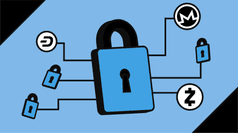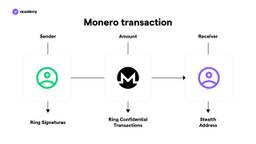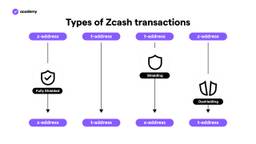Dash, Monero and Zcash: privacy coins
October 29, 2021
7 min

Anonymous cryptocurrencies such as Monero, Zcash and Dash are usually called privacy coins and are designed to make transactions on the blockchain completely anonymous. As always, privacy issues give rise to debate and controversy.
How privacy coins work
Dash, Monero and Zcash are cryptocurrencies with the aim of making transactions anonymous and untraceable. To do this, they obscure the origin of transactions on the blockchain, i.e. the wallet addresses.
Usually, blockchains make it possible to consult every transaction that takes place via explorers, sites accessible to anyone. The data we see on these pages are all composed of strings of numbers and digits: these are the wallet addresses.
We will never see a person’s first and last name written on the blockchain.
However, if a person or organisation makes their wallet address known, then some people will know where certain transactions come from or go to. This is why public blockchains are often described as pseudonymous.
In addition to the addresses, which identify senders and receivers, it is of course also possible to see the amount, transaction status and the timestamp.
For some, this pseudonymity is not enough, either because they simply want to keep their financial transactions confidential, for reasons of competition and corporate secrecy, or simply out of a need for privacy.
The anonymity question on blockchain
The idea of making cryptocurrencies anonymous is highly criticised by financial regulators who need to prevent and control criminal acts facilitated by privacy.
As cryptocurrencies are already complex to regulate, authorities see privacy coins as an additional wall that prevents them from being controlled at all. Regulators are calling for the blockchain to be made less anonymous, through the application of practices such as identity verification.
Some jurisdictions such as South Korea have even banned companies from using privacy coins. This is why many exchanges prefer not to support them, especially fully private ones such as Monero.
Instead, the US Internal Revenue Service (IRS) in 2020 offered a $625,000 bounty to anyone who could successfully track transactions on Bitcoin Lightning Network or Monero.
On the one hand, user identification would prevent some criminal acts on blockchain, but it would also mean that government agencies, hackers, or simply capable users would be able to track any financial transaction and know the identity of the owners of each wallet.
The cypherpunk movement, which supported the birth of cryptocurrencies, was actually born to fight for more privacy on the internet and in computer systems.
In the crypto community, in fact, there are many supporters of complete anonymity as a right to confidentiality and privacy, especially towards institutions.
Within the community itself, however, transparency and sharing are also important values: the fact that the blockchain can be freely consulted makes everyone participate and reassures those who approach it about how it works.
All in all, the current state of the most widely used blockchains is somewhere between these two visions.
The main privacy coins
Monero (XMR)
Monero is perhaps the best known and most “extreme” representative of anonymity, as unlike the Dash and Zcash cryptocurrencies it makes the anonymity of every transaction compulsory. It is based on Bitcoin’s code, in fact its blockchain adopts Proof-of-Work.
The technology that Monero adopts to ensure the anonymity of each transaction consists of 3 main elements:
- Ring Signature – to mask the sender address
- Stealth Address – to mask the receiver address
- Ring Confidential Transactions – to mask amounts
These cryptographic elements allow only the users involved in the transactions to be aware of their details.
When you open a Monero wallet you will have a private view key, a private spend key and an address (public key).
The spend key is used to send payments, the view key is used to view incoming transactions destined for your account, and the address is for receiving payments. The two keys are used to obtain your Monero address.
Ring signatures allow broadcasting the public key of the sender wallet along with other random public keys to the blockchain, so no one knows which one is the real sender. This prevents transactions from being tracked.
Stealth addresses, on the other hand, are a one-time public key. This cryptographic key makes it impossible to tell who is sending what to whom, but it cryptographically associates the sender with the recipient.
These are just the basics of the cryptographic formulas that make Monero private, while allowing miners to verify the correctness of transactions and avoid double-spending.
ZCash and Dash: privacy is optional
They both originate from forks of Bitcoin and make anonymity of transactions optional.
Zcash
ZCash (ZEC) uses zero-knowledge proof technology, a cryptographic algorithm that allows transactions to be verified without the need to disclose their details.
Zcash offers the option of using either shielded (z-address) or unshielded (t-address) addresses.
When a z-address sends ZEC to another z-address, the transaction is completely anonymous, including the amount.
However, it is also possible to send Zcash between a z-address and a t-address, and in this case, the amounts will be public.
Dash
Dash (DASH) is a cryptocurrency and blockchain with a mixed consensus algorithm:
- Proof of Work by Miners
- Proof of Service by Masternodes
Masternodes are the nodes dedicated to the verification of private and instant transactions, thanks to the PrivateSend and InstantSend functionalities.
PrivateSend uses the CoinJoin method to hide the address of one’s wallet from the transaction visible on the blockchain.
To do this, Masternodes take the Dash cryptocurrencies to be sent, separate them into round denominations (0.1 DASH, 10 DASH etc) and mix them in several rounds with other Dash transactions of other people who are using PrivateSend. The correct Dash are then distributed to the final addresses without a hitch.
Other privacy coins
There are many other privacy coins with different anonymity technologies, and in particular, solutions are emerging that are also geared towards scalability, which is now a key issue for any type of blockchain.
Privacy coins are basically a choice of ideology or necessity, but it is not all black and white. There is also a third option, that of projects such as the Dash cryptocurrency, which are committed both to being transparent in pursuing their project and to offering privacy options.




